|
|
|
Sort Order |
|
|
|
Items / Page
|
|
|
|
|
|
|
| Srl | Item |
| 1 |
ID:
086170
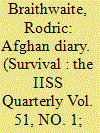

|
|
|
|
|
| Publication |
2009.
|
| Summary/Abstract |
In early September 2008 Rodric Braithwaite travelled to Afghanistan to 'see some of the places (Herat, Pandsher, Salang), talk to some Afghans, and check on the stories my Russian contacts (who go back there all the time) tell me about the positive attitude the Afghans now have towards the Russians'. He kept notes as a record for his own use, and to send back to his family on a daily basis to reassure them that he hadn't been kidnapped. He kindly shared them with Survival, and we present a version abridged to fit the available space. Braithwaite did not meet the kind of people that official visitors to Afghanistan usually meet. He drew a number of conclusions from his conversations:
First, the common belief among Afghans that they were better off under the Russians, and that the last Communist President Najibullah was a better leader than Karzai, may not reflect historical reality; but it bodes ill for the coalition's overall aims. Secondly, the Russian effort in Afghanistan was frustrated above all by their inability to control the frontier with Pakistan: a task which may well turn out to be even harder for the coalition. Thirdly, although the Russians were not defeated militarily in Afghanistan, any more than the Americans were in Vietnam, both the Russians and the Americans failed entirely to achieve their political objectives. The British, by contrast, who ended their nineteenth-century Afghan wars with military victory, sensibly settled for their minimum objective: a monopoly of Afghan foreign policy, which lasted for 80 years. There are no such simple options available today. Finally, there is no certainty that the proposed surge in coalition forces will stabilise the country: the analogy with Iraq is just as false as the earlier analogy between the prospects for democracy in Iraq and what happened in Germany and Japan after 1945.
|
|
|
|
|
|
|
|
|
|
|
|
|
|
|
|
| 2 |
ID:
134170
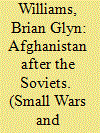

|
|
|
|
|
| Publication |
2014.
|
| Summary/Abstract |
In 1989 the Soviet Union withdrew its forces from Afghanistan leaving the embattled Afghan Communist government of President Mohammad Najibullah to fight against an emboldened mujahideen insurgency. Most experts expected a quick mujahideen victory once the Soviets were no longer directly involved in counterinsurgency operations in support of the Afghan government. But in the spring of 1989 the Afghan Communists beat the odds and defeated a mujahideen rebel offensive designed to capture the eastern city of Jalalabad. This proved to be a turning point, and for the next three years the Najibullah regime held out against the mujahideen 'freedom fighters'. In fact the Afghan Communist regime actually outlasted its sponsor the Soviet Union. The reasons for this remarkable achievement can be traced, in part, to ethnic-tribal divisions among the quarreling mujahideen parties and the Afghan government's ability to exploit them. This largely untold story has obvious implications for understanding the future of post-Karzai Afghanistan, tribalism, ethnicity, and foreign sponsorship in post-US Afghanistan. This article will explore the reasons for the resilience of the Najibullah Communist government and then assess possible implications for a post-2014 Afghan government.
|
|
|
|
|
|
|
|
|
|
|
|
|
|
|
|
| 3 |
ID:
175353
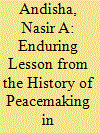

|
|
|
|
|
| Summary/Abstract |
Peace processes offer opportune moments for social and political transformation in embattled nations. There is no perfect formula or peace recipe. As per the existing literature, the ‘ripeness’ of circumstances and timing of a peace process and pertinence of the ‘substance’ of settlements to the root causes of conflict are the main components of a viable peace agreement. In the past 30 years, Afghanistan experienced two unsuccessful peacemaking episodes: first after the Soviet withdrawal in 1989 and the second following the removal of the Taliban in 2001. While failure of the former is primarily attributed to the complexities of circumstance at the time, ineptness of the latter is linked to the primacy of imposed deadlines over inclusive consultations and inadequacy of contents of the Bonn Agreement. By briefly examining substantive characteristics of peacemaking processes in the context of Najibullah’s National Reconciliation Policy and the Bonn process, this article argues that meaningful structural change in favour of an inclusive and participatory political system and institutionalization of a regional balance of interests in foreign relations remain central to enduring peace in Afghanistan.
|
|
|
|
|
|
|
|
|
|
|
|
|
|
|
|
| 4 |
ID:
100392
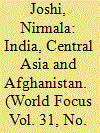

|
|
|
| 5 |
ID:
081851
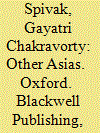

|
|
|
|
|
| Publication |
Oxford, Blackwell Publishing, 2008.
|
| Description |
viii, 365p.pbk
|
| Standard Number |
9781405102070
|
|
|
|
|
|
|
|
|
|
|
|
Copies: C:1/I:0,R:0,Q:0
Circulation
| Accession# | Call# | Current Location | Status | Policy | Location |
| 053516 | 950.429/SPI 053516 | Main | On Shelf | General | |
|
|
|
|
| 6 |
ID:
124149


|
|
|
|
|
| Publication |
2013.
|
| Summary/Abstract |
NATO troops are leaving Afghanistan in 2014, a quarter of a century after Soviet troops ended their occupation. How comparable are the two retreats, and will Afghans suffer fighting and destruction similar to what happened when foreign troops last left? Mikhail Gorbachev, who took the withdrawal decision in 1985, felt the war had become an expensive stalemate. The USSR opted to base its exit strategy on diplomacy and the idea that the Afghan government should pursue peace talks with its armed opponents. This emphasis on negotiations differs from Obama's policy, which remains predominantly military and rejects compromise with the Taliban. Obama and NATO claim progress on the battlefield and argue that combat duties can safely be "transitioned" to newly trained Afghans. But most Afghans are gloomy. Although they do not expect Kabul to fall to the Taliban, they believe that the insurgents will capture large parts of southern Afghanistan. Many also fear that ethnic tensions will grow throughout the country, perhaps leading to conflict between warlords from the Tajik and Uzbek minorities and the Pashtun majority.
|
|
|
|
|
|
|
|
|
|
|
|
|
|
|
|
|
|
|
|
|